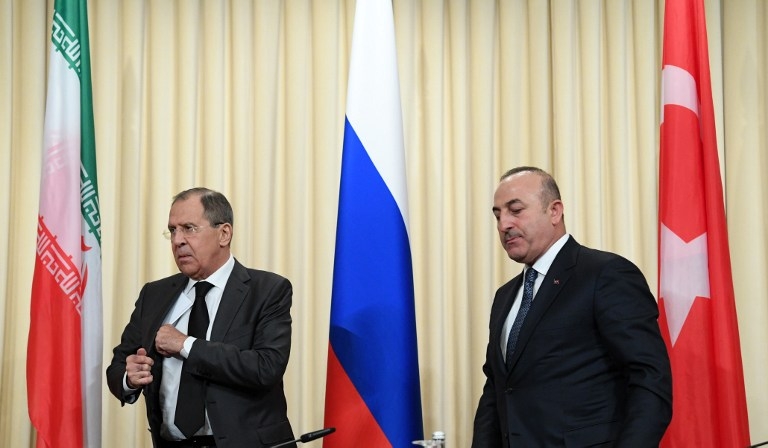Turkey and Russia agree on Syria ceasefire blueprint

ISTANBUL, Turkey – Turkey and Russia have agreed on the wording of a draft text which will result in a Syria-wide ceasefire, Turkish state media reported on Wednesday.
Turkish Foreign Minister Mevlut Cavusoglu said that a “permanent ceasefire and solution in Syria is close,” according to the state-run Anadolu news agency.
Turkish foreign ministry officials are reported as saying that they wish for a speedy approval of the draft by the other main parties in the conflict: Russia and Iran.
Local media cited unnamed Turkish officials as hoping for the ceasefire to take hold as early as Thursday 29 December.
Cavusoglu, who was in Qatar on 26 and 27 December to meet Qatari officials and Syrian opposition groups based there to discuss the future of Syria, spoke to both his Russian and Iranian counterparts on Wednesday.
The planned ceasefire will exclude certain groups such as the Islamic State and the Syrian Kurdish Democratic Union Party (PYD), a key Turkish demand.
The PYD will also be excluded from a political summit in the Kazakh capital Astana to follow the successful implementation of the nationwide ceasefire.
The ceasefire will include all foreign groups fighting alongside Syrian government forces and opposition forces.
Turkish officials are hoping for a successful implementation of the plan akin to the ceasefire agreed in Aleppo earlier in December, which despite hiccups eventually allowed the evacuation of civilians and opposition fighters to Idlib province.
Earlier in December, Russia, Turkey and Iran had agreed to facilitate a process of political dialogue in Astana involving the major actors in the Syrian theatre. The process is not intended as a rival process to the Geneva talks, according to Russia and Turkey, both of whom are at odds with the United States.
Turkey-US spat
On Tuesday, Turkish President Recep Tayyip Erdogan accused the US of providing support to terrorist groups in Syria, including IS, and of failing to keep its promises to Turkey, a coalition partner in the fight against IS.
“Now they [US and coalition partners] have all vanished and they’re giving support to terrorist groups including Daesh, YPG and the PYD. It is very clear. We have confirmed evidence, with pictures, photos and videos,” he said.
Turkey is faced with growing losses as it engages in a prolongued offensive against IS group militants to take the Syrian town of al-Bab.
The US had made clear from the offset that it would not back the Turkish advance on al-Bab, which is part of Ankara's military operation titled Euphrates Shield.
Launched on 24 August and spearheaded by Free Syria Army rebels, the operation is open-ended with the stated aim of clearing a 5,000 square km area in Syria near the Turkish border.
Ankara has said the military operation is intended to clear the area of all terrorist threats emanating from the area close to Turkey, including the PYD and its armed wing the People’s Protection Units (YPG).
This has put it at sharp odds with the US, which not only refuses to designate the PYD as terrorist but also relies on the YPG as its most effective ground force in the fight against IS.
The US Embassy in Ankara issued a statement on Wednesday slamming any insinuations that it is arming terrorists and dismissing Erdogan's claims as "ludicrous". US State Department spokesman Mark Toner said there was no basis for such an accusation.
“The United States government is not supporting Daesh [an alternative acronym for IS]. The USG did not create or support Daesh in the past. Assertions the United States government is supporting Daesh are not true,” the press release read.
The statement also denied US support for Kurdish groups in Syria. “The United States government has not provided weapons or explosives to the YPG or the PKK – period. We repeatedly have condemned PKK terrorist attacks and the group’s reprehensible violence in Turkey,” it added.
Erdogan on Tuesday also expressed a desire to see Saudi Arabia and Qatar at any talks held in Astana.
Unnamed Turkish officials were quoted on Wednesday as saying that it was agreed between Ankara and Moscow that Saudi Arabia, Qatar and Iran would also be present at any potential talks in Kazakhstan.
Stay informed with MEE's newsletters
Sign up to get the latest alerts, insights and analysis, starting with Turkey Unpacked
Middle East Eye delivers independent and unrivalled coverage and analysis of the Middle East, North Africa and beyond. To learn more about republishing this content and the associated fees, please fill out this form. More about MEE can be found here.




